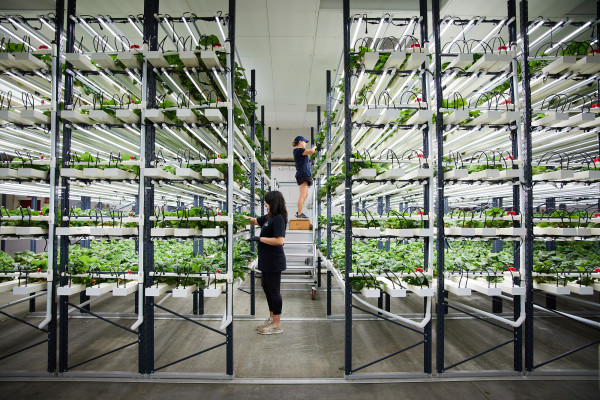26 Seasons strawberry facility
Through the support of government funding, a (now) not-so-small strawberry farm based in Foxton had the ability to scale up their production and sell a premium product at a commercial scale.

26 Seasons Limited received a $2.0-million Regional Strategic Partnership Fund (RSPF) loan in 2023 to support the growth of their indoor hydroponics-based horticulture business.
The Regional Strategic Partnership Fund
In 2017, 26 Seasons started vertically growing microgreens in Wellington, but COVID-19 cut this project short, and it required them to pivot. A new opportunity and demand for product was identified, and the company has specialised in the production of off-season strawberries ever since.
With the funding, the project's aim was to scale up its indoor strawberry farm production at an existing facility in Foxton by acquiring and installing strawberry plants and equipment. After trialling 1,000 strawberry plants in 2021 and having 8,000 under lights in their facility in 2022, 26 Seasons’ aim was to scale up to 50,000 plants – producing up to 1 million punnets of strawberries a year.
The bigger and long-term plan is to export the technology, tapping into global concerns about food security.
Since scaling up, the project has successfully grown strawberries at a commercial scale using vertical farming within a controlled environment and produces strawberries for retail, food service and ecommerce markets out of the traditional growing season.
26 Seasons now operates the largest Controlled Environment Agriculture (CEA) farm in New Zealand. In 2023, they reported plant yield to be up to 100% greater than traditional outdoor growers.
Outcomes and benefits
With strawberries being one of the most sprayed fruits globally, and those in Aotearoa New Zealand being imported out of the growing seasons in the thousands of tonnes – supporting a project like this has both economic and environment benefits for the country (if not its benefits for the tastebuds too). With 26 Seasons producing strawberries in a more sustainable and resource efficient way, it could just be the beginning for fresh produce.
Producing strawberries at their CEA, there are minimal pesticides, herbicides or chemicals used, and no soil used at all. Approximately 80% of the water used in the system is re-used again and again (with the remaining 20% being consumed by the plants), and the packaging used is recyclable – all huge environmental benefits.
Unfortunately, New Zealand isn’t immune to supply chain vulnerability and extreme weather events – which leads to significant supply and yield reductions across various crops, including strawberries. Projects like this help supply retailers with premium strawberries all year round – supporting the economy.
Finally, this project also has its advantages for seasonal workers – with workers being able to work through winter, while also enjoying the indoor comforts in a not-so-favourable outdoor season.
Great tasting, locally grown strawberries outside of the traditional growing seasons in an environmentally friendly manner.
Published: 21 February, 2024

